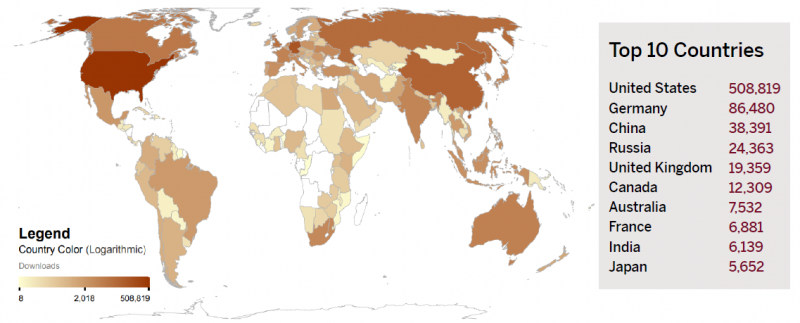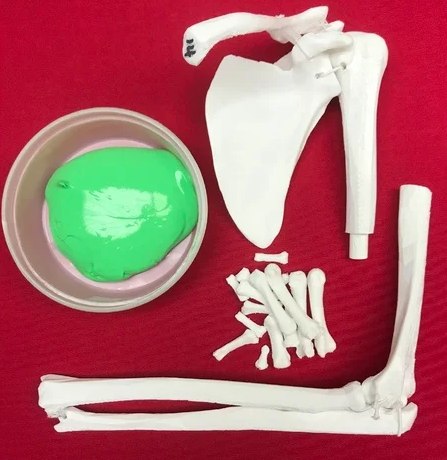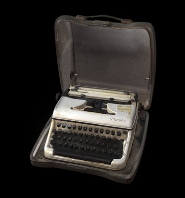At IUPUI we work for Open Access every week of the year. So, when OA Week rolls around, it’s a good time to reflect on why we’re doing this and on the fruits of our labor.
Why We Work for Open
The theme for this year’s Open Access Week is “Open for Whom? Equity in Open Knowledge.” The “open for whom?” question is a call for those of us who provide services to support the creation, dissemination, and use of open knowledge to think about who those services most benefit and who we might be leaving out. IUPUI is by no means among the most well-funded institutions in the United States—we’re a public university with a civic-minded, metropolitan focus. But, as IUPUI students, staff, and faculty, we have many advantages that others do not. Our constituents have access to resources (subscriptions, funds, software, tools, and expertise), that are missing at other institutions. For example, University Library includes a small, but dedicated technology operations team. This group of employees allows the library to host and modify its own instances of the open source software systems that we use to publish peer reviewed journals, display cultural artifacts, and openly archive the university’s scholarly record. Universities with fewer resources and libraries with a different staffing profile are less likely to offer OA services in the way that we do here at IUPUI. So, if University Library cares about open knowledge for everyone, everywhere, we have to think about how our services do and do not enable others to offer similar services. Although open access works may be free to read and reuse, the labor of creating, hosting, archiving, and sharing them is not. This means that libraries are thinking carefully about how we invest our time and resources in a variety of directions. (An example of this careful thinking is evident in our recent endorsement of MIT’s Framework for Publishing Contracts.)
Happily, we’re taking steps in a direction to make issues of equity in scholarly communication transparent to our organization and campus. We have begun this work, in part, by identifying and publishing our “Open Values Statement.” At IUPUI University Library we work for open knowledge, because we believe “that access to and creation of resources should be available to all.” As Tina Baich describes (in a post for OA Week), this belief and our values will guide both how we invest in our own OA services and how we give back to the open knowledge community at large.
The Results of Our Open Labor
10,000 Open Access Articles
October 2019 marks the fifth anniversary of the IUPUI Open Access policy. This policy, adopted by the IUPUI Faculty Council, gives faculty authors the rights to make their scholarly articles OA in the institutional repository, IUPUI ScholarWorks. Thanks to the generous support of our faculty and the hard work of the library, we make 70% of the faculty’s peer reviewed, published articles open access for the world to read. As of October 2019, we have made more than 10,000 articles free to read and readers have downloaded the articles more than 1 million times. For OA Week, the library released school-by-school reports of these outcomes. You can read the campus level report or look for a specific school report in IUPUI ScholarWorks.
IUPUI Faculty Member Wins International Open Publishing Award Last spring the library launched its inaugural Open Educational Resources (OER) award. OERs save students money by making learning objects and digital textbooks free and reusable. The IUPUI OER award was a big success—we honored 8 IUPUI faculty finalists for their contributions to Open Education. We gave one of those honorees, Robin Janson, an award for her innovative work to create open, 3D printable skeletal models for use in Occupational Therapy education. Proudly, our award winner’s accomplishments have been recognized at an international level. Earlier this month the Coko Foundation announced Robin Janson as one of four recipients of their Open Content Award.
Last spring the library launched its inaugural Open Educational Resources (OER) award. OERs save students money by making learning objects and digital textbooks free and reusable. The IUPUI OER award was a big success—we honored 8 IUPUI faculty finalists for their contributions to Open Education. We gave one of those honorees, Robin Janson, an award for her innovative work to create open, 3D printable skeletal models for use in Occupational Therapy education. Proudly, our award winner’s accomplishments have been recognized at an international level. Earlier this month the Coko Foundation announced Robin Janson as one of four recipients of their Open Content Award.
Ray Bradbury’s Personal Artifacts
The library’s open work includes 3D digitization work to preserve and display cultural heritage collections of importance to our campus and our community. One of our newer projects includes a partnership with The Center for Ray Bradbury Studies. The Center is packed with many of the author’s personal artifacts. Museum Studies graduate intern and exhibition curator, Abi Lindstedt, spent a semester making 3D scans of artifacts from the Bradbury Collection. The collection was highlighted during the Indiana University 200 Festival Bicentennial Ceremony and can be freely viewed online in the library’s Center for Digital Scholarship Sketchfab account.
These are just a few of the open projects that University Library supports. We’re busy working to make knowledge open for everyone, year-round. Have a question? Have an idea for an open knowledge project you’d like to investigate? You can learn more about our services at the library’s Center for Digital Scholarship.
